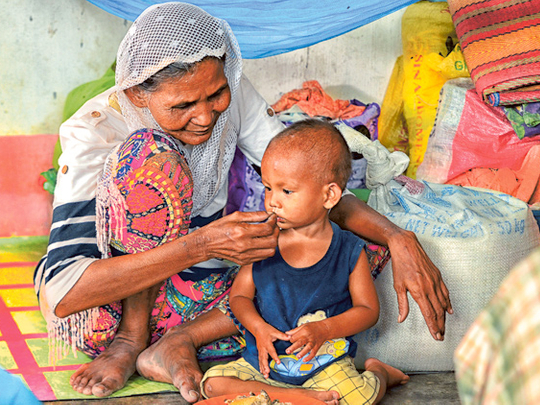
Manila: Children continue to suffer from military atrocities in the southern Philippines, despite the government granting an autonomous area and enhanced self rule for Filipino-Muslims there, a rights group said on Thursday.
One child — four-month-old Ali Paniga — was wounded in his left thigh while asleep in his parents’ house in Dapiawan village, Datu Saudi, Maguindanao province, on June 7, Cristina Palabay, secretary general of Karapatan, a rights group, told Gulf News.
Soldiers who fired at the house were from the 22nd Mechanised Brigade of the Philippine Army, Palabay quoted the child’s father, Mohammad Panigas, as saying.
Mohammad Abdul Karim and his son Mehad Mohammad, 14, were abducted after they were questioned by members of the 45th Infantry Battalion at a military checkpoint in Meta village, Datu Unsay, Maguindanao on July 3, said Palabay, who is preparing a report on the rising number of children being killed, abducted, and harassed by security forces in war-torn Mindanao.
A few days later, soldiers of the 45th IB conducted surveillance activities near the home of the father and son who are still missing, Palabay said.
At the same time, children from Mangkay and Kapatagan in Kapalong, Davao del Norte, were forced to serve as guides and shields during military operations conducted by the 60th Infantry Battalion in the civilian community on July 20.
“The military also occupied schools, disrupting the classes and various school activities,” Palabay said.
“In these incidents, the affected families are afraid to speak up for fear of retaliation from the military. The military’s presence in their communities has intimidated them.”
About 18 children were killed because of military operations code named Oplan Bayanihan (community welfare) in remote villages in the southern Philippines, since 2010, Palabay added.
The military’s Oplan Bayanihan has “not spared children and people in civilian communities from being killed, injured and abducted,” she added.
Observers said that human rights violations of security forces have not stopped even after the ouster of former dictator Ferdinand Marcos by a people-backed military mutiny in 1986. Marcos ruled for 20 years, from 1965 to his exit in 1986.
When Corazon Aquino became president after Marcos, she established the country’s democratic processes, which also resulted in the change of power through elections.
But human rights violations have continued during the reign of the succeeding presidents who were all elected by the people, Palabay said.
“One solution to this problem is the pull out of government troops from civilian communities in Mindanao, where five million Filipino-Muslims are based,” said Palabay.
Human rights violations of Filipino-Muslims have not ended despite peace settlements forged by the Philippine government with two major Filipino-Muslim rebel groups in the south, she added.
The Philippine government and the Moro National Liberation Front (MNLF) forged two pro-autonomy peace settlements in Tipoli Libya in 1976, and in Malaysia in 1996. The Philippine government and the Moro Islamic Liberation Front (MILF) signed a pro-autonomy agreement in March this year after talks that began in 1997.
The agreements have resulted in the expansion of existing Autonomous Region in Muslim Mindanao (ARMM) and enhancement of self rule in their homeland territory.
Member countries of the Organisation of Islamic Cooperation (OIC) have brokered the Philippine government’s political settlements.











